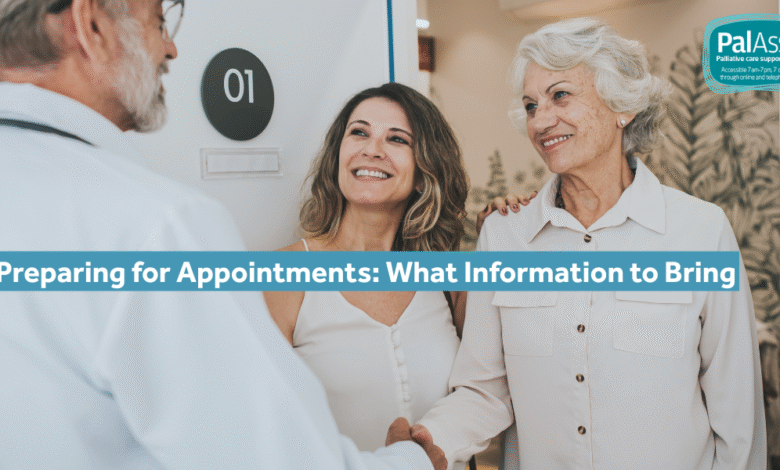Preparing for Appointments: What Information to Bring

Preparing for medical appointments means bringing the right documents and health information. But having random papers isn’t enough. You need organised details that help your healthcare team understand your complete picture. Without preparation, appointments become rushed rather than productive.
You might be wondering what counts as ‘complete’ health information. It comes down to three key areas: what medical history to document, how to build your health record, and which family health history details are relevant. These three elements give doctors the context needed for better care recommendations.
Arriving unprepared means missing details, repeating tests, or leaving with questions (and yes, we’ve watched this happen). If you’re unsure where to start, PalAssist‘s nurses can help you figure out what information to bring and how to organise it.
Stick with us to find out what to bring and why it helps.
What Medical History Should You Bring?
You should bring three key types of medical history: past diagnoses and conditions, current medications with dosages, and any allergies or reactions you’ve experienced. Your medical history tells the story of your health. And doctors rely on it to make good decisions about your care.
Let’s break down what each part means and why it’s important.
Essential medical history to include:
- Past diagnoses and conditions: To give your doctor the full picture, list any illnesses, surgeries, or health issues you’ve had. Where possible, include dates as well. Your doctor uses this timeline to spot patterns and connections. Even old conditions can affect your current care.
- Current medications and dosages: Writing down everything you take helps prevent dangerous interactions between medicines. Be sure to include over-the-counter items, vitamins, and supplements with exact dosages. Through our work with families, we’ve seen how common supplements can interact badly with prescription medicines.
- Allergies and reactions: Document any drug allergies, food issues, or reactions, along with the symptoms that occurred. Even mild past reactions can become severe next time. This protects you from harmful medicines.
But wait, there’s more to it. Keeping this list updated is just as important as creating it in the first place. Also, if you’re caring for someone else, ask their GP for a medical history summary. Most practices can print one for you.
Your Complete Health Record in One Place
Creating one central health record saves time and reduces the chance of forgetting important details when you’re under pressure. Let’s be honest here, saying ‘I feel bad’ doesn’t help doctors much. You need specific information that they can actually use.
Here’s how to put it all together.
How to build your health record:
- Gather recent test results: Your blood tests, scans, and specialist reports from the past 6-12 months show trends your doctor needs to see. So collect these documents and keep them in one place. Our nurses regularly help people track down test results they didn’t realise were important for their appointments.
- Document current symptoms: Write down what you’re experiencing, even if it seems minor. Track when it started, how frequently it occurs, and what makes it improve or worsen. These details with specific dates and times let your doctor connect the dots.
- Track your medications: What medicines are you taking right now? Make a detailed list that includes medication names, dosages, frequency, and prescribing doctors. Without complete records, medication errors become more likely, particularly when moving between different care settings. Also, remember to update it whenever anything changes.
- Add contact details: For better care coordination, include your regular GP, specialists, and pharmacy contacts. This contact list helps your healthcare team work together smoothly. Once you’ve organised your personal health details, there’s another important piece. That’s your family’s health background.
Now that you know how to organise your personal health information, let’s look at why your family’s medical history deserves the same attention.
Key Details About Your Family Health History
Your family’s health background holds more clues than you might think. That’s because certain conditions run in families, and doctors use this information to assess your risk and suggest preventive measures or early screening.
We’ll show you which family health details doctors find most useful.
What Family Conditions to Record
Note any serious illnesses your parents, siblings, grandparents, and children have had, particularly heart disease, diabetes, some cancers, and mental health conditions. Where possible, include ages at diagnosis, especially if they were diagnosed young. Even details like knowing your uncle had a heart attack at 52 can influence your screening schedule.
When You Don’t Have Complete Information
Don’t worry if your family history has gaps (and trust us, every family has those mystery relatives no one knows much about). The good news is you can still share what you do know. Even partial information helps your doctor assess risk.
Support for Adopted or Disconnected Families
If you’re adopted or don’t have access to family health information, let your doctor know. They’ll focus on other risk factors like lifestyle and personal screening instead. When you need help understanding what information to bring or how to talk about gaps in your family history, reach out to PalAssist’s registered nurses.
Start Your Next Appointment with Confidence and the Right Information
Walking into appointments prepared helps you get better care. You’ll spend less time scrambling for details and more time getting answers that actually help. That’s because the three components we’ve covered (your medical history, complete health record, and family health background) work together to paint a full picture for your healthcare team.
If organising all this feels overwhelming, you don’t have to figure it out alone. PalAssist offers free, personalised support from registered nurses who understand exactly what information your doctors need. Call 1800 772 273 or chat online between 7am-7pm, seven days a week, for guidance tailored to your situation.




